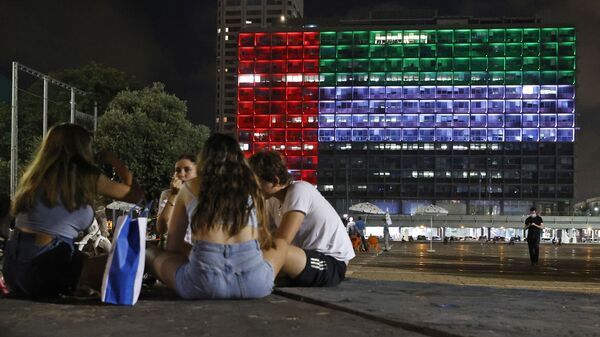The UAE and the US have presented the agreement as a way to establish peace in the region by thwarting Israel’s plans to annex parts of the occupied West Bank, even though Israeli Prime Minister Benjamin Netanyahu has stated that the plans remain “on the table,” Al-Jazeera reported.
“So, generally Palestinians across the political spectrum, the diaspora and in Palestine, completely reject this deal. It’s a total stab in the back, but it’s not a surprise at all,” Nassar told host John Kiriakou.
‘Formalization’ of Long-Covert Relations
Nassar said the agreement was “merely the formalization of what has existed in covert cooperation between the UAE - and other states, for that matter - and Israel for decades.”
“UAE relations with Israel can be traced as far back as to the 1990s, and in recent years, after the Saudi-led blockade of Qatar, they have been coming into the limelight through military and intelligence cooperation and joint military exercises, athletic competitions and so on,” Nassar said. “It’s definitely no surprise, but it’s a definite stab in the back, and Palestinians unequivocally reject it.”
The peace deal is simply a tactic being used by Saudi Arabia and the Gulf states to establish a “united front” with Israel against Iran, Nassar explained.
“Saudi Arabia has been behind the scenes, encouraging the UAE and Bahrain to move forward in putting those covert relations with Israel into the limelight and make the Arab public accept this kind of relationship. But in reality, most Arabs living in those countries completely reject those normalized relations, because they view Israel as their enemy so long as there is no restoration of Palestinian rights, and military occupation of the occupied West Bank and the Gaza Strip persists. So, while Saudi Arabia has fostered covert relations with Israel for decades, its allies in the region, in the Gulf - the UAE and Bahrain - are now moving forward in putting those relationships into the limelight,” Nassar explained.
Palestinians Used as ‘Bargaining Chips’
Following the peace deal’s announcement, the Palestinian Authority released a statement accusing the UAE of "betraying al-Aqsa, Jerusalem and the Palestinian cause,” the Jerusalem Post reported.
"The Palestinian leadership considers this step as a destruction of the Arab Peace Initiative and resolutions of the Arab summits," the statement added.
“I think Palestinians, like I said, are always used as a bargaining chip between those powers in the region. And even when Qatar was under pressure from Saudi Arabia and the Emirates in 2017, when they imposed a blockade on Qatar, it tried to escape this blockade by trying to appease to the Israel lobby in the US. So Palestinians are often used as bargaining chips, and you can see this in the agreement that was announced yesterday, on Thursday,” Nassar noted.
“So, the United Arab Emirates started spinning the agreement to bring its relationship with Israel in a formal diplomatic way by saying ‘Oh, we’re scoring a win for Palestinians. Israel is putting annexation on hold.’ Obviously, this is all a lie. First of all, it was the US that put Israel’s annexation plans on ice a few weeks ago in July, namely, but Netanyahu, shortly after the announcement was made, reaffirmed his total commitment to annexation. Since Israel's founding, it has been de facto annexing land in the occupied places,” she said.
“If you look at the ground, annexation has never stopped. Israel has been forcibly displacing Palestinians. Just this month, I mean, it’s two weeks into August, and more than 100 Palestinians in the West Bank have been displaced through Israeli demolitions, forced demolitions of their homes, building colonies in flagrant breach of international law. This violent colonization has never stopped, and it will not stop as a result of this agreement,” Nassar continued.
“The second thing is: Israel, as we speak, is imposing or tightening its collective punishment on the Gaza Strip. So, as a response to incendiary balloons that have been launched from Gaza to southern Israel starting fires, Israel has imposed new restrictions on fishers, fishing off of Gaza’s coast. It has closed the Kerem checkpoint, which is the only place Israel allows goods in and out of Gaza for all but vital humanitarian needs. It’s even stopped the import of fuel to Gaza, which reduces the number of hours of electricity Palestinians in the strip can have. Especially in this scorching summer heat, it’s preposterous,” she stated.
Regardless of how the UAE tries to paint the deal, it will accomplish nothing for Palestinians, Nassar explained.
“Qatar has been sending millions of dollars into Gaza since 2018, but, it must be noted, while this aid may help in the short term, it also relieves Israel of its responsibility as the occupying power under international law toward Palestinians it is occupying. While certain Gulf aid may appease Palestinians in Gaza or elsewhere in the short term, it relieves Israel of its responsibility, and it makes no meaningful change in Israel's blockade of its territory or its military occupation in the West Bank,” Nassar told Sputnik.
“The UAE in reality asked for nothing and received nothing for Palestinians in exchange for this deal. It’s purely for the benefit of the UAE and its allies in the Gulf,” she said.



